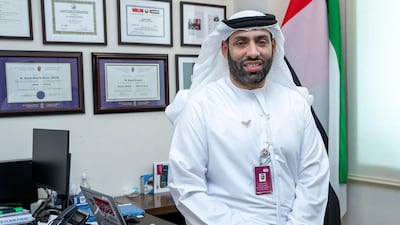Cervical cancer rates in the UAE have been slashed by 50 per cent thanks to a widespread vaccination campaign and early screening, a new report revealed.
The latest national cancer registry data showed case numbers fell significantly between 2015 and 2017, the most recent year in which data was recorded.
The figures were revealed in the first comprehensive review of gynaecological oncology in the UAE, published by the Burjeel Cancer Institute.
Doctors said the achievement gives an insight into the effectiveness of health campaigns and widespread education on the importance of vaccinations against the human papillomavirus (HPV), a major cause of cervical cancer.
“The uptake for the vaccine improves when there is good education on why it is needed,” said cancer specialist Dr Humaid Al Shamsi, a professor at the University of Sharjah's College of Medicine.
“A national health campaign ran about four or five years ago. These figures showed that was a success as people have accepted the HPV vaccine across the country.
“We strongly believe the number of cancer cases has decreased because of the vaccine, and not just because of better screening that allows doctors to diagnose and treat earlier.”
Of all cancers, those related to gynaecology in the uterus, cervix and ovaries account for the fifth, sixth and eighth most common cancers in women in the UAE.
Burjeel Cancer Institute said there were 81 cases of cervical cancer in 2015, but that number was reduced to just 38 in 2017, despite more widespread screening.
Dr Al Shamsi expects the downward trend to continue in the years to come.
“With more screening we would expect to see more cases, but there has been a decline, which sends a strong message that the vaccination programme has been a huge success,” he said.
“The population has generally grown since 2017 when these figures were extracted, and there has also been an increase in vaccinations, so the decline in cancer rates is something we would expect to continue.
“To look at the number of cases per 100,000 people would be the best way to assess the effectiveness of screening and vaccination programmes.
“It shows the importance of education and screening and the difference they make.”
The human papillomavirus is a viral infection passed between people through skin-to-skin contact.
There are more than 100 variants, more than 40 of which are sexually transmitted.
Cancer is the third leading cause of death in the UAE.
The escalating rate of gynaecological cancers in the UAE led to health authorities taking proactive steps to reduce case numbers.
The highest number of cervical cancer cases in the UAE were reported in the 35-39 age group.
It is rarely seen in women younger than 20 and survival rates are good.
If detected in stage one, the survival rate of five years post-diagnosis is between 80 per cent and 99 per cent, and 60 per cent to 90 per cent if in stage two of cancer.
More progressive cancers in stage three have a 30 per cent to 50 per cent chance of survival for five years or more.
Preventable disease
Huge steps have been taken in the Emirates, such as the National Cancer Registry, HPV vaccination drive, healthcare professionals’ workshops and training and screening campaigns for women across the country.
Dr Basma Ali Shehabi, a specialist in obstetrics and gynaecology at Burjeel Hospital, Sharjah, said the vaccine has made cervical cancer a preventable disease.
“Young women should be educated about the HPV virus and encouraged to take the vaccine because we know it is responsible for 99 per cent of cervical cancer cases,” she said.
“For the last 10 years, we have campaigned to educate all women, and girls from secondary school onwards, to give them information on its importance.
“With the support of the government to give a free vaccine to nationals, it has been very successful.
“Otherwise the cost is quite expensive and some will not be able to take it as a result. Ideally, all women should have access to a free vaccine.”
Despite its success, the cost of an HPV vaccine delivered between the ages of 11 and 26 may be prohibitive for some.
The vaccine is usually delivered in three doses, costing $200 (Dh730) per injection.
While UAE citizens can receive the vaccine free of charge, insurance does not cover the cost in most cases.
It is recommended that women take a pap smear test every three years, an HPV test every five years or a combined pap test and HPV co-test every five years.
“To find the early stages or pre-cancerous lesions via screening, allows us to deliver successful treatment,” Dr Shehabi said.
“First we remove the lesions, then we can use radiology, chemotherapy and immunotherapy to increase survival rates.
“Screening and early detection have also been very effective in reducing these rates of cervical cancer.”










